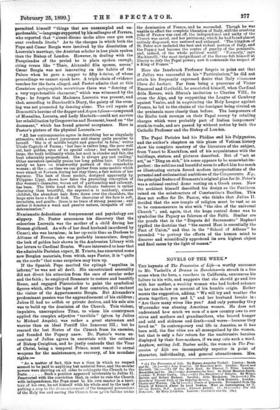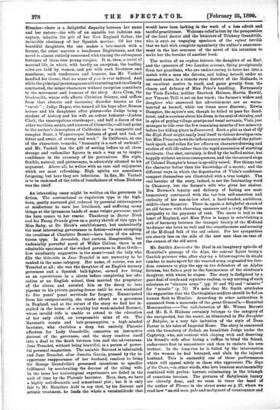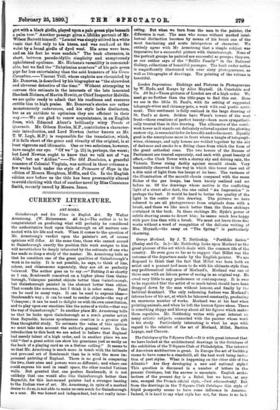NOVELS OF THE WEEK.*
THE keynote of The Procession of Life—a worthy successor to Mr. Vachell's A Drama in Sunshine—is struck in a fine scene when the hero, a ranchero in California, announces his failure to his wife, and suggests that she should go and live with her mother, a wealthy woman who had looked askance on her son-in-law on account of his humble origin. Esther scouts the suggestion, adding, " We will try and weather the storm together, you and I," and her husband breaks in : " Are there many wives like you ? And only yesterday Gu y Warrender was abusing American women. He does not understand how much we men of a new country owe to our wives and mothers and grandmothers, who braved hunger and cold and sickness and death—and worse--because they loved us." In contemporary real life in America, as it has been said, the fine riles are all monopolised by the women, but that is only a fair return for the unobtrusive heroism displayed by their fore-mothers, if we may coin such a word. Anyhow, setting Jeff. Barber aside, the women in The Pro- cession of Life are incomparably superior in point of character, individuality, and general attractiveness. Mrs.
• (1.) The Proceision of Life. By Horace Annesley Vachell. London: Bands and Co. [6.1—(2.) Jane Treachel. By Hamilton Aide. London Hurst and Blackett. [6s.]—(3.) Of the High Road. Br Eleanor 0, Price. London : Macmillan and Co. (611.)—(4.) Aneroestes the Gaul. By Edzar Maurice Smith, London: T. Maher Unwin. [61.)—(5.) The Daughters of Babylon. By Wilson Barrett and Robert [lichens. London: John MacQueen. [65.1—(6.) The Records of Vincent Trill, of the Detective Service. By Dick Donovan. London : °hats° and Windus. [Sa. 6d]—(7.) Trento et Quarante. Translated from the French of Edmond About by Lord Newton. With an Introduction by T. 0th-nn Bowles, M.P. Landon: Edward Arnold. [3,. Od 1—(8.) The Old Dominion. By Mary Johnston. London : Constatde and Co.
Slumber—there is a delightful disparity between her name and her nature—the wife of an amiable but indolent sea- captain, inherits the grit of her New England father, the invincible obstinacy of her Spanish mother. Of her two beautiful daughters, the one makes a love-match with a farmer, the other marries a handsome Englishman, and the novel is almost entirely concerned with tracing the subsequent fortunes of these two young couples. It is, then, a novel of married life, in which, with hardly an exception, the leading rOles are held by women, and yet with such freshness and
manliness, such tenderness and humour, has Mr. Vachell handled his theme, that no sense of give is ever induced. And
while the principal personages are all interesting and excellently contrasted, the minor characters without exception contribute to the movement and humour of the story. Arza Clam, the blacksmith, whose wife affects Christian Science, and suffers from that obscure and harassing disorder known as the " snoot " ; Judge Mapes, who named all his boys after Roman heroes and his daughters after plants—the Judge being a student of history and his wife an ardent botanist—Joshua Clark, the unscrupulous storekeeper ; and half a dozen of the other worthies, saints, and sinners of Clumville,—all lend point to the author's description of California as "a composite and complex State, a Wagneresque fantasia of good and bad, of bitter and sweet, of strong and weak." In California, as one of the characters remarks, "humanity is a sort of cocktail," and Mr. Vachell has the gift of setting before us all these strange and unfamiliar figures in such a way as to inspire confidence in the accuracy of his portraiture. His style, flexible, natural, and picturesque, is admirably attuned to his argument. Above all, he writes with an ease and enjoyment which are most refreshing. High spirits are sometimes fatiguing, but here they are infectious. In fine, Mr. Vachell is to be reckoned of the tribe of benefactors of whom Dickens was the chief.
An interesting essay might be written on the governess in fiction. The conventional or regulation type is the high- born, gently nurtured girl, reduced by parental extravagance or misfortune to earn her livelihood, and suffering many things at the tyrannous hands of some vulgar parvenue, until the hero comes to her rescue. Thackeray in Doctor Birch and hie Young Friends gives us a pretty sketch of this type in Miss Raby, at Dr. Birch's establishment, but undoubtedly the most interesting governesses in fiction—always excepting the creations of Charlotte Bronte—have been of the adven- turess type. In Armadale, that curious, disagreeable, but undeniably powerful novel of Wilkie Collins, there is an admirable specimen of the wicked governess in Miss Gwilt- how excellently suggestive is the name!—and the lady who fills the title-rOle in Jane Treachel is not unworthy to be ranked in the same category. Her name, of course, was not Treachel at all ; she was the daughter of an English nursery governess and a Spanish ball-fighter, earned her living as an equestrienne in a circus before completing her edu- cation at an English school, then married the proprietor of the circus, and assisted him as the decoy to lure pigeons to his private gaming-house until he was sentenced to five years' penal servitude for forgery. Emancipated from his companionship, she starts afresh as a governess in England, and at the outset of the story we find her in- stalled in the house of a wealthy but weak-minded Baronet, whose invalid wife is unable to attend to the education of her only child, an irrepressible minx of six. The Baronet's cousin and heir-presumptive, a high-minded barrister, who cherishes a deep bat entirely Platonic affection for Lady Grandville, conceives an instinctive distrust of the governess, and the story resolves itself into a duel to the death between him and the adventuress. Jane Treachel, without being beautiful, is a person of power- ful personal magnetism. The amiable Baronet is infatuated, and Jane Treachel, alias Juanita Garcia, pressed by the in- opportune reappearance of her husband, resolves to bring Sir George GrandvWe's presumed intentions to speedier fulfilment by accelerating the decease of the ailing wife. In the issue her toxicological experiments are foiled in the nick of time by the Platonic barrister. Here, then, we have a highly melodramatic and sensational plot ; but it is only fair to Mr. Hamilton Aide to say that, by his discreet and artistic treatment, he lends the whole a verisimilitude that would have been lacking in the work of a less adroit and tactful practitioner. Welcome relief is lent by the pomposities of the local doctor and the humours of Tricksey Grandville, who is such an engaging specimen of the enfant terrible that we hail with complete equanimity the author's announce- ment in the last sentence of the novel of his intention to make her the heroine of another book.
The notion of an orphan heiress, the daughter of an Earl, and the cynosure of two London seasons, flying precipitately from her guardians, who are endeavouring to force her into a match with a man she detests, and hiding herself, under an assumed name, in a remote rural district of the Midlands, is
an excellent motive in itself, and gains greatly from the charm and delicacy of Miss Price's handling. Fortunately for Viola Fairfax, neither Sherlock Holmes, Martin Hewitt, nor Vincent Trill is set on her track; the farmer's widow and daughter who answered her advertisement are as warm- hearted as herself, while ten times more discreet ; Edwin Dampier, the squire's son, though he failed to pass for Sand- hurst and is careless about his dress, is the soul of chivalry, and in spite of prying village gossips and venal servants, Viola just manages to tide over the few remaining months of her minority before her hiding-place is discovered. Such a plot as that of Of the High Road might easily lend itself to violent developments, but Miss Price eschews the inflammatory methods of the yellow- back epoch, and relies for her effects on character-drawing and studies of still life rather than the rapid succession of startling incidents. One shot, certainly, is fired by the baffled suitor, but happily without serious consequences, and the threatened siege of Colonel Dampier's house is speedily raised. Few things test the character better than the knowledge of a secret ; and the different ways in which the depositaries of Viola's confidence comport themselves are illustrated with a true insight. The real heroine of the story, indeed, is not the fascinating ward in Chancery, but the farmer's wife who gives her shelter. Mrs. Downes's loyalty and delicacy of feeling are most humorously contrasted with the tactless self-assertion and curiosity of her son-in-law elect. a hard-headed, ambitious, middle-class financier. There is, again, a delightful sketch of an old farmer with charming manners and a truly Hibernian antipathy to the payment of rent. The scene is laid in the heart of England, and Miss Price is happy in establishing a sort of harmony between the tranquil beauty of the Midland landscape she loves so well and the steadfastness and serenity of the Midland folk of the old school. For her sympathies are clearly less on the side of the new men than on that of the owners of the old acres.
Mr. Smith's Aneroestes the Gaul is an imaginary episode of Hennibars passage of the Alps, the central figure being a Gaulish prisoner who, after slaying a fellow-captive in single combat to make sport for the wearied army, is granted his free- dom, consents to play the spy on the defenders of an Alpine fortress, but falls a prey to the fascinations of the chieftain's daughter. with whom he elopes. The story is disfigured by a good deal of crude and repulsive realism, to say nothing of such solecisms as "sinuous arms " (pp. 10 and 94) and " missive" for " missile " (p. 76). We note that Mr. Smith attributes the suggestion that the Carthaginian soldiers should be fed on human flesh to Himilco. According to other authorities it emanated from a namesake of the great General's,—Hannibal Monomachns.—The collaboration of Mr. Wilson Barrett and Mr. R. S. Hichens certainly belongs to the category of the unexpected, but the result, as illustrated in The Daughter of Babylon, is a very fair imitation of the style of Dean Farrar in his tales of Imperial Rome. The story is concerned with the treachery of Jediah. an Israelitish Judge under the Captivity, who, not content with eloping with and deserting his friend's wife after hiring a ruffian to blind the friend, endeavours first to assassinate and then to enslave his own brother. In the long-run he is foiled by the intervention of the woman he had betrayed, and slain by the injured husband. This is eminently one of those performances which will appeal solely to those who appreciate The Sign of the Cross,—in other words, who love luscious sentimentality combined with profns • horrors culminating in the triumph of conscious heroism. The pictures of Babyloniah luxury are cleverly done, and we seem to trace the hand of the author of Flames in the street scene on p. 27, where we read how "an old man, pale and malignant of countenance and girt with a black girdle, played upon a pale green pipe beneath a palm tree." Another passage gives a lifelike portrait of Mr. Wilson Barrett himself: "Lemuel was simply attired in a white tunic that fell only to his knees, and was confined at the waist by a broad girdle of dyed wool. His arms were bare, and on his feet he wore sandals." The book alternates, in short, between pseudo-idyllic simplicity and sumptuously upholstered opulence. Mr. Hichens's versatility is commend- able, but we find the "Babylonian numbers" of his pale green pipe far less entertaining than the acid humours of his Green Carnation.—Vincent Trill, whose exploits are chronicled by Mr. Donovan, is described by his biographer as "the shrewdest and cleverest detective of the time." Without attempting to canvass this estimate in the interests of the late lamented Sherlock Holmes, of Martin Hewitt, or Chief Inspector Melville, we are quite ready to admit that his readiness and resource entitle him to high praise. Mr. Donovan's stories are rather monotonously cadaverous, and his style lacks distinction, but as an antidote to optimism they are efficient in their way.---We are glad to renew acquaintance, in an English dress, with Edmond Abont's brilliantly witty Trente et Quarante. Mr. Gibson Bowles, M.P., contributes a character- istic introduction, and Lord Newton (better known as Mr. T. W. Legh, M.P.) is responsible for the translation, which, if it falls short of the grace and vivacity of the original, is at bast vigorous and idiomatic. One or two solecisms, however, have caught our eye. " Of we " (p. 25) is, perhaps, the worst; but Lord Newton ought to know that we talk not of "an Aide," but an "Aldine."—The Old Dominion, a graceful romance of Colonial Virginia, was noticed in these columns a few weeks back under the style of Prisoners of Hope in the edition of Messrs. Houghton, Mifflin, and Co. In the English edition now before us the title has been presumably altered to avoid clashing with that of another novel by Miss Constance Smith, recently issued by Messrs. Inns.








































 Previous page
Previous page